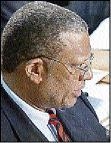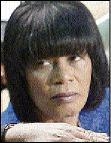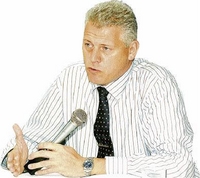A 'force' for change
Published: Sunday | November 8, 2009

Robert Buddan
Peter Phillips has said rising crime and violence have been features of Jamaican life virtually every year in our 47 years of Independence. This might be related to the fact that, as Tony Harriott has said, policing has not fundamentally changed since 1940 while the nature of crime and criminality most certainly have. Mark Shields, in fact, said that the Jamaican police force needs major surgery, if it can be saved at all, and probably needs to 'die' so that a new force can be created. Peter Bunting said that a new form of governance for that force is needed, a new police authority, probably not quite a new force.
A high-level panel of parliamentarians, a former minister and the current Opposition spokesman on national security, ex-deputy commissioner of police, university criminologist, and lawyer and talk show host gathered at St Luke's Church under Dr Omar Davies' chairmanship on October 29 to talk about how to achieve a safe and just Jamaican society. Representatives of the People's National Party (PNP) and concerned citizens gathered there to search for policy solutions towards the party's emerging Progressive Agenda.
crime still top concern


Phillips (left) and Simpson Miller (right).
The gravity of the problem is such that, as Peter Bunting pointed out, crime remains the people's top concern despite the fact that Jamaica is facing its most severe economic crisis in decades, if not since Independence. This is why Portia Simpson Miller repeated on the occasion that the fight against crime must include every Jamaican from each community, constituency, and parish right up so that there could be a people's progressive agenda for a safe and just society. Everyone agreed.
Indeed, the people had a responsibility to change the 'informer' culture and the culture of vengeance (pointed to by Harriott), the dysfunctional culture of the police force itself (Shields) and the audience felt that the culture of the people from which the police are drawn, the general culture of corruption in Jamaica, the class bias of the society and policing all needed to change. The people should be mobilised (Portia Simpson Miller, Peter Phillips) such as by making citizens part-time volunteers in assisting the police force (audience, Shields).
What police force should we have? Thirty-six police personnel and 17 civilians are among the 53 persons arrested for corruption between January and the end of October (Jamaica Constab-ulary Force (JCF) Anti-corruption Unit). Mark Shields would probably say the problem is deeper and much more fundamental than these numbers indicate. Harriott and Bunting put the problem in the framework of the paramilitary post-Morant Bay Rebellion history of the JCF and its suppressive character. If the JCF is a legacy of that era of suppression, should it be disbanded?
If so, what should we put in its place? We need a force, many suggested, that is more community oriented, respectful of human rights and dignity, able to work with families and schools, deserving the confidence and trust of the people and one that the police itself could trust. It would be a force in which citizens could play a role in community and national policing. It would not be a paramilitary organisation. It would have to turn its suppressive operations on its head. It could not be seen to murder, extort, rape and conspire with criminals. The culture that turns good cops into bad cops or that causes well-intentioned trainees to succumb to corrupt acts would have to be destroyed.
An Associated Press report carried in overseas newspapers on the same night of the forum read, "Jamaica is resisting a United States request to hand over a suspected crime boss with ties to the Caribbean nation's governing party amid reports he is stockpiling weapons in his Kingston stronghold to prevent arrest." The reference of course is to Christopher Coke of Western Kingston, the constituency represented by the prime minister.
While this report was being transmitted around the world, Clyde Williams was on the forum panel pleading for consistency between administrations in the way they respond to extradition requests. He pointed to the present government's unnatural approach in a hypothetical case very much resembling Christopher Coke's case. He suggested that the Government might misunderstand its responsibilities under the Westminster separation of powers between judiciary and executive. But one wonders if it all is a deliberate ploy to delay the extradition process.
extradition requests

Shields
Days before this forum Peter Bunting had issued a release fearing for the loss of Jamaica's reputation as a law-abiding state and of being treated as a rogue state because of the government's delay. Just before this, he was on television saying the PNP had consistently followed its obligations in fulfilling numerous extradition requests, regardless of the claimed political connections of those persons.
This is important because, as Peter Phillips stressed, organised international crime and the associated drugs, guns and murders are the fuel that feed domestic crime. Small states like Jamaica need international help just like larger states such as Colombia have recognised. We must be true to our extradition and mutual assistance treaties or we will lose international assistance.
Peter Bunting repeated his call for a new Police Services Authority, overseen by a bipartisan board, modelled off the electoral commission. Peter Phillips thought we would score only three out of 10, at best, on the technology we need. Shields agreed with proactive policing. Williams wanted the right to appeal against possible judges' errors and decisions on bail. Others in the audience suggested the need to implement whistle-blowing legislation, compulsory military service, polygraph exams for policemen, biometric identification for all Jamaicans, community development, and for members of Parliament (MPs) to take control of their constituencies.
MP Ronnie Thwaites drew attention to the importance of social intervention against poverty. It is true that many poor people are law-abiding, but since it is also true that many better off and rich people are not, then we need policies to strengthen our capacity to deal with financial crime. It is at the root of the world financial crisis and costs Jamaicans hundreds of millions, maybe billions of dollars each year.
If crime pays, crime fighting pays for itself and Peter Phillips reminded us that these worthy solutions will cost plenty.
We also need to retrain police and citizens in what a safe and just society demands of both. We need police and soldiers trained to defend and protect the people. We need better studies of the police force and, based on these, a rebranding, re-imaging and restructuring of the force. If it is resistant to change we must find out where the change agents in the force are and let them drive change rather than being driven out. We need more, much more than a new police commissioner.
All of this would lead to what the PNP president hopes will be warranted trust and confidence in citizens, police, judiciary, and government. Crime and lawlessness do not threaten to overrun the society they are already on top of us. It is for precisely this reason why she is right in saying that we all must become involved. We are waiting to be mobilised.
Robert Buddan lectures in the Department of Government, University of the West Indies, Mona. Email: Robert.Buddan@uwimona.edu.jm or columns@gleanerjm.com.
